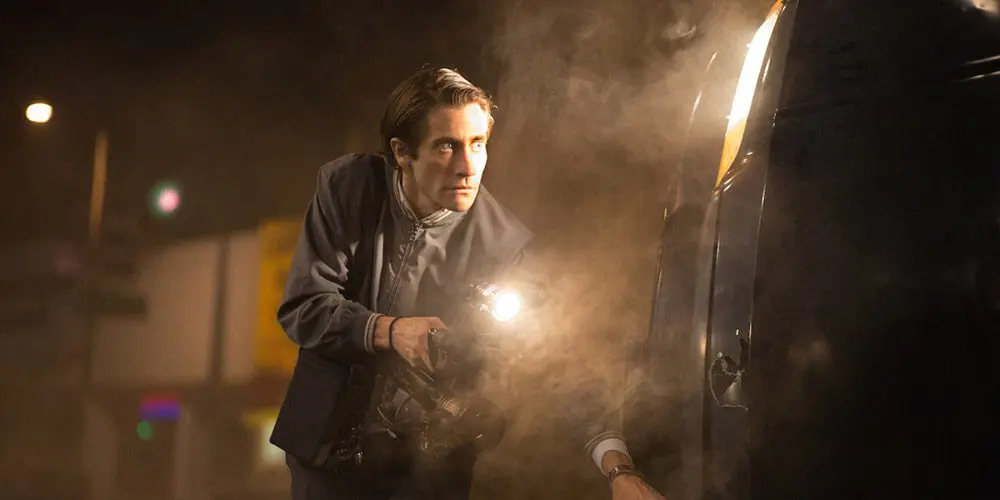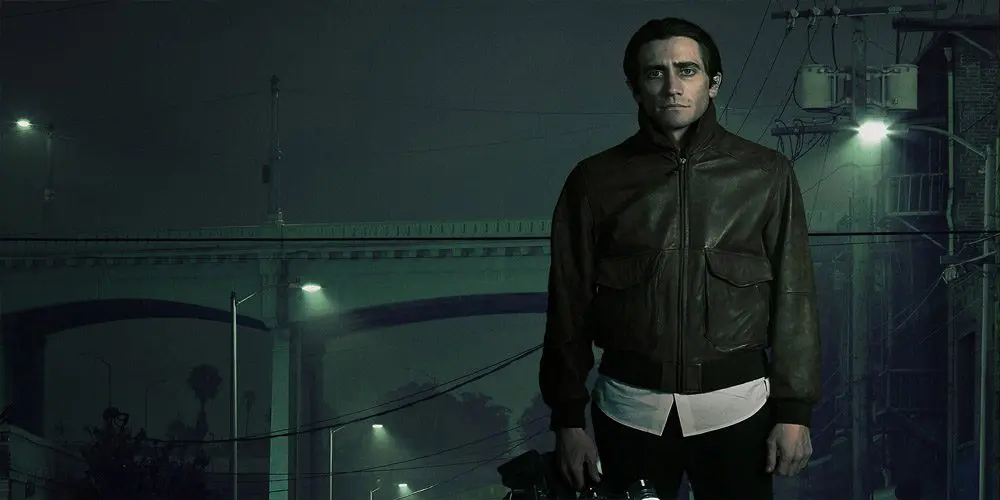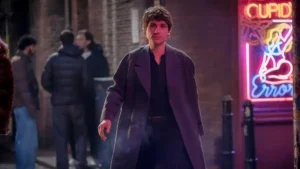If it bleeds, it leads.
That’s the slogan of Bill Paxton’s ambulance-chasing “nightcrawler” Joe Loder; the words of dubious wisdom he bestows upon gaunt, bug-eyed Lou Bloom as he bumbles onto the scene of a pre-dawn car crash.
There’s money to be made prowling the L.A. streets as a freelance videographer, peddling captured tragedies to TV news networks. And Bloom, a thieving guttersnipe desperate for a job to call his own, sees an opportunity in the City of Angels’ harsh and grubby underbelly.
Many called Bloom 2014’s best antihero, but he’s a villain through and through. He has no redeeming or even human qualities. He’s an absurd caricature of a nakedly materialistic, morally foul American Dreamer, armored in hollow management twaddle and self-help mantras and self-taught business acumen. “You can find most anything if you look hard enough,” Lou says at one point. He’s talking about the internet.
That’s where everything he knows and believes in seems to come from; the real world outside it and the breadth of human experience it contains are just spreadsheets he downloaded to assess his own performance.
Jake Gyllenhaal plays Bloom without a trace of irony. He shed several pounds for the role. That his character is a corporate vulture who feeds on carrion is ironic in that sense. Bloom himself looks almost corpse-like, shambling around in badly-fitting skin. There’s nothing behind his eyes, least of all awareness of how invasive or legally questionable his work is.
This is a man who thinks nothing of dragging a car crash victim into a vehicle’s headlights – the injuries look more vivid in the glare. And all that matters is the scoop, after all.
The audience wants something they can’t turn away from, the kind of footage that has to come packaged with a banner: “Viewer discretion is advised.” They’ll keep watching, of course. They always do.
READ: Movies like Whiplash you must watch
As a TV executive working the vampire shift at a bottom-rung news station, Rene Russo’s Nina understands this better than anyone. When Bloom approaches her with his first pitch (a close-up of a carjacking victim, riddled with bullets and rapidly expiring), she sees an opportunity in him; in a man who will go where and do what others refuse to.
She writes off his careerist jargon as quirky. She designates the best kind of victim for him to seek out and film – “well-off, injured at the hands of a poor or a minority.” She lets him know he has a good eye.
Bloom is delusional enough that, after pawning a stolen bike in exchange for a cheap video camera and police scanner, he begins referring to “my company”. When he sits down with Rick, a destitute trick-turning street kid played with subtlety and edge by Four Lions’ Riz Ahmed, he explains, “I run a successful TV news business.” He doesn’t. Not yet.
But Nina allows him to believe he could, perhaps if he had an assistant like Rick – someone desperate enough to be manipulated into working for a $30-per-night pittance.
Russo is a scene-stealer, imbuing her hard-bitten, driven exec with fear and vulnerability. Ahmed, too, is a vital supporting presence, giving perhaps the film’s only sympathetic turn. But this is Gyllenhaal’s show – easily the best performance of his career in perhaps the best movie of an already remarkable body of work.
His over-the-top dialogue, and the nasal patter with which he delivers it, should come across as comedic; it most certainly would were it not for the terrifying edge he lends it. Bloom has no backstory, but Gyllenhaal’s performance is vivid enough to paper over all of those cracks in his character.
Behind all this is screenwriter Dan Gilroy (the real-life husband of Russo) making his directorial debut. His script is superb and refreshingly aware of where to shine focus for best dramatic effect.
The moral vacancy of tabloid journalism is not news, nor is it treated as such. It never even occurs to most of the characters that what they’re doing might be wrong. There’s a media-skewering satire in here somewhere, but it never feels like the point.
The film takes just as many swipes at corporate mentality and self-help culture. But its centre is a dark, psychological character study. Everything else orbits slowly around the black hole tug of Bloom’s sociopathy.

There’s visual punch too, courtesy of director of photography Robert Elswit’s urban nightscapes, drenched in waxen lamplight. This is a nervous, nocturnal Los Angeles, where even the days feel like nights.
It evokes Nicolas Winding Refn’s Drive as much as Michael Mann’s Collateral, both set in the same city, the latter shot both digitally and on film, much the same as Gilroy’s work here in Nightcrawler.
There’s a steady pulse beating beneath the blood-slicked blacktop. The movie scurries along like an insect, peering into depravity with wide-eyed curiosity.
The audience too feels complicit. Are we rooting for Bloom? I couldn’t say. But the movie is so tightly-wired to his psychology that were he to fail it would stop dead in its tracks.
We shouldn’t want such a callous, abhorrent bully to thrive, but he has to so we can see what happens next. We can’t look away. We are the masses, after all, hungry for the truth. We don’t want the media to coddle us, to block our view or hide the worst – we have to see it for ourselves.
“Viewer discretion is advised”. We’ll keep watching, of course. We always do.




